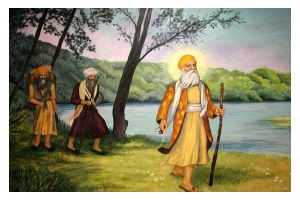Post by Leon on Apr 24, 2012 18:14:34 GMT

Guru Nanak (Gurmukhi: ਗੁਰੂ ਨਾਨਕ) (Saturday 15 April 1469 - Monday 22 September, 1539), the founder of Sikhism and the first of the ten Gurus of the Sikhs, was born in the village of Talwandi.
Also called Rai Bhoe-ki Talwandi, the village now known as Nankana Sahib, is near Lahore in present-day Pakistan. He was born, according to all ancient Sikh records, in the early morning of the third day of the light half of the month of Baisakh (April - May) in the year 1469; this is believed to be Saturday 15 April 1469. However, the Sikhs now celebrate this auspicious event each year on the full moon day in November; consequently, the date in November changes from one year to another. See
Before Guru Nanak departed for his heavenly abode in 1539, his name had travelled not only throughout India's north, south, east and west, but also far beyond into Arabia, Mesopotamia (Iraq), Ceylon (Sri Lanka), Afghanistan, Turkey, Burma and Tibet. As Guru's Birth Anniversary (also called "Guru Nanak Jayanti") is lunar linked, it celebrated on the full moon in November. The event was celebrated on 15 November in 2005; 5 November in 2006; 24 November in 2007; 13 November in 2008; and will be celebrated on 2 November 2009, 21 November 2010, 10 November 2011 28 November 2012, 17 November 2013 6 November 2014, 25 November 2015, 14 November 2016, 4 November 2017, 23 November 2018, 12 November 2019 and 30 November 2020.
The name "Nanak" was used by all subsequent Gurus who wrote any sacred text in the Sikh holy scripture called the Guru Granth Sahib. So the second Sikh Guru, Guru Angad is also called the "Second Nanak" or "Nanak II". It is believed by the Sikhs that all subsequent Gurus carried the same message as that of Guru Nanak and so they have used the name "Nanak" in their holy text instead of their own name and hence are all referred to as the "Light of Nanak."
Guru Nanak also called Satguru Nanak, Baba Nanak, Nanak Shah Faqir, Bhagat Nanak, Nanak Kalandar etc. by different people of religions and Cults.
Also called Rai Bhoe-ki Talwandi, the village now known as Nankana Sahib, is near Lahore in present-day Pakistan. He was born, according to all ancient Sikh records, in the early morning of the third day of the light half of the month of Baisakh (April - May) in the year 1469; this is believed to be Saturday 15 April 1469. However, the Sikhs now celebrate this auspicious event each year on the full moon day in November; consequently, the date in November changes from one year to another. See
Before Guru Nanak departed for his heavenly abode in 1539, his name had travelled not only throughout India's north, south, east and west, but also far beyond into Arabia, Mesopotamia (Iraq), Ceylon (Sri Lanka), Afghanistan, Turkey, Burma and Tibet. As Guru's Birth Anniversary (also called "Guru Nanak Jayanti") is lunar linked, it celebrated on the full moon in November. The event was celebrated on 15 November in 2005; 5 November in 2006; 24 November in 2007; 13 November in 2008; and will be celebrated on 2 November 2009, 21 November 2010, 10 November 2011 28 November 2012, 17 November 2013 6 November 2014, 25 November 2015, 14 November 2016, 4 November 2017, 23 November 2018, 12 November 2019 and 30 November 2020.
The name "Nanak" was used by all subsequent Gurus who wrote any sacred text in the Sikh holy scripture called the Guru Granth Sahib. So the second Sikh Guru, Guru Angad is also called the "Second Nanak" or "Nanak II". It is believed by the Sikhs that all subsequent Gurus carried the same message as that of Guru Nanak and so they have used the name "Nanak" in their holy text instead of their own name and hence are all referred to as the "Light of Nanak."
Guru Nanak also called Satguru Nanak, Baba Nanak, Nanak Shah Faqir, Bhagat Nanak, Nanak Kalandar etc. by different people of religions and Cults.



